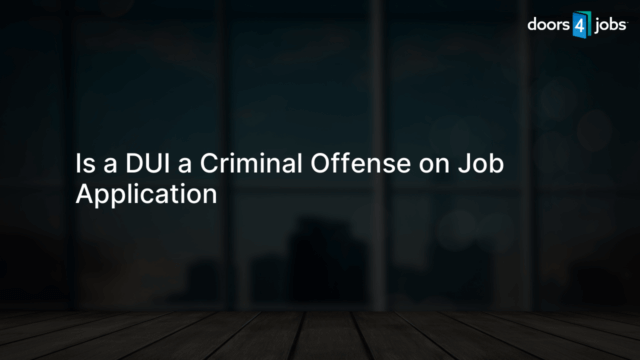When you get fingerprinted for a job, your fingerprints are captured electronically or on paper, then submitted to law enforcement agencies for a background check. This process ensures that you have no criminal history or pending charges that may be disqualifying for the position. It ultimately helps the employer maintain a safe and trustworthy work environment.
Fingerprinting for Job Applications: The Basics
Fingerprinting is a common procedure in the job application process, particularly for positions in law enforcement, healthcare, education, and finance. The primary objective of fingerprinting is to verify your identity and conduct a background check, ensuring that you have no criminal history or pending charges that could disqualify you from the position. This helps the employer maintain a safe and trustworthy work environment.
Preparing for Fingerprinting
When you’re required to provide your fingerprints for a job application, the employer will give you specific information on where and when to do so. Ensure you bring a valid government-issued photo ID, such as a driver’s license or passport, and any additional documents requested by your employer.
How Fingerprinting Works
During fingerprinting, your prints will either be captured electronically using a digital scanner or manually using ink on a fingerprint card. In most cases, electronic fingerprinting is preferred, as it provides a quicker turnaround time and reduces the chances of errors and smudges.
Submitting Your Fingerprints
Once your fingerprints are captured, they’ll be submitted to the appropriate law enforcement agency, usually the FBI or state police, to conduct a thorough background check. In some cases, your fingerprints may also be cross-referenced with other databases, both national and international. This process helps identify any criminal history, outstanding warrants, or pending charges that may affect your job eligibility.
Results of the Fingerprint Background Check
Upon completion of the analysis, the law enforcement agency will send the results directly to your employer within a few days to a few weeks, depending on the method used and the jurisdiction. It’s important to note that timeframes may vary depending on the volume of requests and the specific requirements of the position.
Understanding the Findings
If the background check results are clear, and no disqualifying information is found, you’ll likely move forward in the hiring process. Keep in mind that if there are any discrepancies or issues discovered, the employer is required to inform you and provide you an opportunity to address the matter before making a final employment decision.
Ensuring Accuracy of Your Fingerprint Records
Occasionally, fingerprint background checks may yield inaccurate or incomplete information. To ensure fairness during the hiring process, you have the right to request a copy of your criminal records or challenge the accuracy of the results. In such cases, you should contact the reporting agency to ask about the process and provide any necessary documentation to support your claim.
Privacy and Security of Your Fingerprint Data
It’s natural to be concerned about privacy when it comes to fingerprinting. Rest assured, your fingerprints and the information derived from them are securely maintained. Employers are required to follow strict protocols to protect your personal information, and they are generally not allowed to share your fingerprints or background check results with third parties without your consent.
Fingerprint Denials and Appeal Procedures
If your fingerprint background check results in a denial of employment, the employer must provide a written notice informing you of the reasons for this decision. The notice should also include information about the appeal process and any deadlines for submitting an appeal.
Appealing a Denial
In the event that you want to dispute the accuracy of your fingerprint background check results, which led to a denial of employment, it’s crucial to act quickly. Contact the reporting agency as soon as possible to initiate an appeal process. Be prepared to submit additional documentation to support your case, which may include court records, police reports, or a letter of explanation detailing the circumstances surrounding the issue in question.
Impact of Criminal Records on Job Opportunities
While a criminal record may not automatically disqualify you from all job opportunities, it can certainly influence an employer’s decision. Every employer has its own set of policies when it comes to criminal records, and some positions may have strict regulations disqualifying applicants with specific criminal histories. However, many employers are open to considering the context and circumstances surrounding an applicant’s past, giving them an opportunity to demonstrate their potential as an employee.
Frequently Asked Questions on Fingerprinting for Jobs
When it comes to job-related fingerprinting, there may be several common questions and concerns about the process. In this FAQ section, we provide clear and concise answers to help you better understand what’s involved in fingerprinting and how it may impact your job application.
How long does it take to receive the results of a fingerprint-based background check?
Results of a fingerprint background check can take anywhere from a few days to a few weeks, depending on various factors such as the method used, the jurisdiction, and the volume of requests. Electronic fingerprint submissions typically have a faster turnaround time compared to ink-based submissions.
Will a minor offense from several years ago be a problem?
It depends on the employer and the specific requirements of the job. While some positions may have strict regulations, many employers are willing to consider the context and circumstances of the offense. Applicants with minor offenses from several years ago may still be considered for employment, depending on individual employer policies.
Can I still apply for a job if my fingerprint background check results are not clear?
Yes, you can still apply for a job. If there are discrepancies or issues in your fingerprint background check results, the employer must inform you and provide you an opportunity to address the matter before making a final decision. In some cases, you may be asked to submit additional documentation or explain the circumstances surrounding the issue before moving forward in the hiring process.
Can I request a copy of my fingerprint background check results?
Yes, you have the right to request a copy of your criminal records or challenge the accuracy of the results. To do so, you should contact the reporting agency and ask about the process, as well as provide any necessary documentation to support your claim.
How long are my fingerprints kept on file after a background check?
The retention period for your fingerprints varies depending on the jurisdiction and specific agency handling the background check. In general, fingerprints are stored in secure databases for a certain period of time, after which they may be purged or destroyed. For more information on fingerprint retention, you should contact the relevant law enforcement agency responsible for fingerprint processing.











